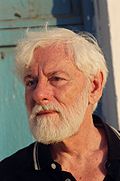Source: Gush Shalom
THERE IS an old Chinese curse that says: "May you live in historic times!" (If there isn't, there should be.)
This week was a historic time. The Crimea seceded from Ukraine. Russia annexed it.
A dangerous situation. No one knows how it will develop.
AFTER MY last article about the Ukrainian crisis, I was flooded with passionate e-mail messages.
Some were outraged by one or two sentences that could be construed as justifying Russian actions. How could I excuse the former KGB apparatchik, the new Hitler, the leader who was building a new Soviet empire by destroying and subjugating neighboring countries?
Others were outraged, with the same passion, by my supposed support for the fascist gangs which have come to power in Kiev, the anti-Semites in Nazi uniforms, and the American imperialists who use them for their own sinister purposes.
I am a bit bewildered by the strength of feeling on both sides. The Cold War, it seems, is not over. It just took a nap. Yesterday's warriors are again rallying to their flags, ready to do battle.
Sorry, I can't get passionate about this side or that. Both, it seems to me, have some justice on their side. Many of the battle cries are bogus.
THOSE WHO rage against the annexation of the Crimea by the Russian Federation and compare it to Hitler's "Anschluss" of Austria may be right in some sense.
I remember the newsreels of ecstatic Austrians welcoming the soldiers of the Fuhrer, who was, after all, an Austrian himself. There can be no doubt that most Austrians welcomed the "return to the fatherland."
That seems to be the case now in the Crimea. For a long time the peninsula had been a part of Russia. Then, in 1954, the leader of the Soviet Union, Nikita Khrushchev, a Ukrainian himself, presented the Crimea as a gift to Ukraine. It was mostly a symbolic gesture, since both Russia and Ukraine belonged to the same Soviet state and were subject to the same oppression.
But the main point is that the people of the Crimea were not consulted. There was no referendum. The majority of the population is Russian, and undoubtedly wishes now to return to Russia. It expressed this wish in a referendum that, on the whole, seems to be quite authentic. So the annexation may be justified.
Vladimir Putin himself brought up the precedent of Kosovo, which seceded from Serbia not so long ago. This may be a bit cynical, since Russia strenuously objected to this secession at the time. All the Russian arguments then are now contradicted by Putin himself.
If we leave out cynicism, hypocrisy and great power politics for a moment, and stick to simple moral principles, then what is good for the goose is good for the gander. A sizable national minority, living in its homeland, has a right to secede from a state it does not like.
For this reason I supported the independence of Kosovo and believe that the same principle applies now to Catalonia and Scotland, Tibet and Chechnya.
There is always a way to prevent secession without using brute force: to create conditions that make the minority want to stay in the majority state. Generous economic, political and cultural policies can achieve this. But for that you need the wisdom of farsighted leaders, and that is a rare commodity everywhere.






